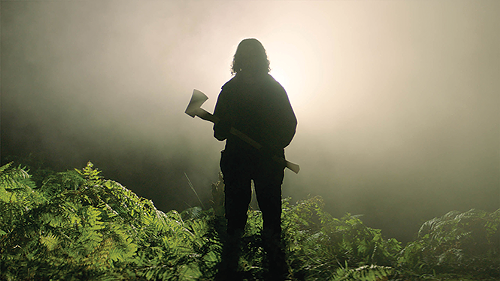Viral Video
Ben Wheatley's In the Earth explores the pandemic through the lens of a psychedelic thriller.
By Scott Renshaw @scottrenshawWhat will pandemic art look like? It's not a hypothetical question any more—between a spate of recent documentaries, and quickie fiction projects like the Netflix quarantine rom-com caper Locked Down—but it's also a question that was never going to have a single easy answer. People were going to respond to a weird time in a wide variety of ways, and some of those ways were bound to be weird themselves.
Take writer/director Ben Wheatley's In the Earth, for example. Even if the setting of a story during a viral pandemic in England didn't give you a clue, you just need to stick around for the closing credit for a "COVID production assistant" to know that this was a very specific response to the past year. And it's also not exactly a leap of the imagination to take a scary time and turn it into horror. But what exactly is Wheatley teasing out by combining his pandemic creepshow with a kind of mystical environmentalism?
Before we get there, we're introduced to Martin Lowery (Joel Fry), a scientist heading from the city to a forest outpost, having volunteered to seek out Dr. Olivia Wendle (Hayley Squires), a researcher who hasn't communicated in months. Park ranger Alma (Ellora Torchia) serves as a guide to bring Martin through the forest to Dr. Wendle's encampment, but along the way it becomes clear they aren't alone in the woods.
Wheatley builds a strong foundation for his world as Martin arrives at the ranger station—a converted vacation lodge, with no one in the vicinity doing much vacationing—and is required to go through a variety of tests so he can be cleared to stay. The word "COVID" is never specifically mentioned, leaving more general terminology like "third wave" to allow for the possibility that this is the present, or perhaps a near future.
Things shift once Martin and Alma begin their multi-day trek into the woods, and while there are a few references to the outside world—specifically, the possibility that some people have attempted to flee from the contagion in the city to more remote places—the focus is on a different tone and subtext. Martin and Alma encounter another man, named Zach (Reece Shearsmith), and there's an intriguing notion of how people attempt to be civilized with one another after a time spent in isolation, wondering if every new person is a potential threat. Fry also makes for a different kind of protagonist, his obvious discomfort with the outdoors as an inveterate city-dweller manifesting itself in a variety of ways that set up the clash between humanity and the natural world.
It's in that area where In the Earth starts to go kind of bonkers, as it delves into folk tales of a possibly-benevolent/possibly-not forest spirit, and a de facto cult arising to worship that spirit. Wheatley gets back to his genre roots with a mix of body horror and hallucinatory images—and, fair warning to all those who might be affected by such things, a lot of strobe lighting—to emphasize his protagonists' sense of disorientation, while attempting at the same time to build an entire mythology full of witchcraft, herb lore and the notion of a responsive, conscious force of nature that feels like Wheatley spent a bit too much time watching M. Night Shyamalan's The Happening.
So is Wheatley diving into similar territory as that ill-fated Shyamalan joint, using the rise of a killer virus as a way to tell us that the natural world has a bone to pick with us? It doesn't take a ton of dot-connecting to get the sense that that's where In the Earth wants to lead us, but it feels like Wheatley is taking an awfully circuitous path to get there. His unsettling visual storytelling feels like a way of tossing a cloak of enigma over something that's actually fairly clear thematically. Add "psychedelic thriller" to the list of ways artists chose to dive into this pandemic, and maybe remove it from the checklist as one that doesn't necessarily need to be done again.
More by Scott Renshaw
-
Feature film review: THE BEAST
A filmmaker's compelling ideas get a bit tangled in references to his creative influences.
- Apr 17, 2024
-
Faces of Salt Lake County book and portrait reception
Images and personal stories in a new book reveal local demographic diversity
- Apr 17, 2024
-
Film Reviews: New Releases for April 12
Civil War, Escape from Germany, Coup de Chance, Hundreds of Beavers, La Chimera, Sting
- Apr 11, 2024
- More »
Latest in Film Reviews
Readers also liked…
-
Power Plays
Two satirical comedies explore manipulations and self-delusions by those with power.
- Aug 31, 2022




